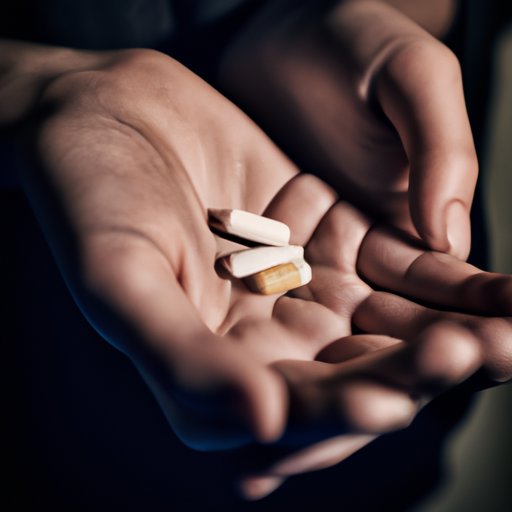
Introduction
Opiates, also known as opioids, are powerful drugs that can be highly addictive. When someone becomes dependent on opiates and tries to quit, it can be a painful and difficult process. Opiate withdrawal is the body’s response to the sudden absence of the drug, and it can produce a range of unpleasant symptoms. Some people wonder if opiate withdrawal can be deadly. In this article, we explore the truth, risks, and recovery options related to opiate withdrawal.
The Deadly Truth: Can You Really Die From Opiate Withdrawal?
Opiate withdrawal can be a dangerous process, and, in some rare cases, it can lead to death. The risk of death is highest during the early stages of withdrawal when an individual experiences severe dehydration, vomiting, and diarrhea. Additionally, pre-existing medical conditions, such as heart disease or respiratory issues, can increase the risk of complications. Some individuals may also be at higher risk due to a history of drug abuse, malnutrition, or poor immune function.
In 2018, approximately 15,000 people in the United States died from opioid overdoses. While most of these deaths were related to prescription or illicit opioids, some of them may have been caused by complications from withdrawal. For example, someone who is detoxing from opioids may be more likely to relapse and inadvertently take too much, leading to fatal overdose.
Understanding Opiate Withdrawal: The Effects on the Human Body
Opiate withdrawal can cause a range of physical and psychological symptoms. Common physical symptoms include sweating, nausea, diarrhea, muscle aches, and tremors. Psychological symptoms may include anxiety, depression, irritability, and insomnia. These symptoms can be particularly challenging to manage on your own and can result in severe discomfort and distress. Over time, ongoing opiate abuse and withdrawal can also lead to organ damage, immune system suppression, and other serious health concerns.
Withdrawal symptoms can be particularly difficult to manage in the long term, and many individuals relapse after attempting to detox on their own. That’s why it’s essential to seek professional help when experiencing opiate withdrawal. Medical professionals can help you manage symptoms, reduce the risk of complications, and support you on the road to recovery.
Breaking the Cycle: Treatment Options for Opiate Addiction and Withdrawal
There are several options for managing opiate addiction and detoxification. Medically-assisted detox, which typically involves medications to manage withdrawal symptoms, is often the most convenient and comprehensive approach. Medically-assisted detox helps ensure the individual’s safety and well-being while managing the physical and psychological symptoms of withdrawal.
Behavioral therapy and alternative treatments, such as meditation or acupuncture, can also be helpful in the recovery process. Recovery is a long-term process, and addiction is a chronic condition. Ongoing support is critical for maintaining sobriety, reducing the risk of relapse, and addressing the underlying issues that led to the addiction in the first place.
The Hidden Risks of Going Cold Turkey: Why Self-Detox from Opiates Could Be Deadly
Quitting opiates abruptly, known as “cold turkey,” can be dangerous and is not recommended. Abruptly stopping opiate use can result in acute withdrawal symptoms, which can range from severe discomfort to life-threatening complications such as seizures or strokes. Additionally, going cold turkey increases the risk of relapse, as many individuals rely on opioids to manage the symptoms of withdrawal.
If you are struggling with opiate addiction, it’s essential to seek professional guidance and support throughout the detox process. Attempting to detox on your own is unsafe and can result in long-term health concerns, such as damage to your organs or immune system.
Surviving Opiate Withdrawal: Tips and Strategies for Coping with the Symptoms
If you are currently experiencing opiate withdrawal, there are several things you can do to manage symptoms and reduce the risk of relapse. It’s essential to stay hydrated and maintain a balanced diet to support your body’s natural healing processes. Try gentle exercises such as yoga or walking, as they can help relieve muscle tension and manage anxiety. Meditation and deep breathing exercises may also help reduce symptoms such as insomnia or restlessness.
It’s essential to find support from loved ones and professional resources such as addiction specialists, therapists, or support groups. These resources can offer guidance, accountability, and a sense of community during a challenging time.
What Happens After Opiate Withdrawal? A Look at Long-Term Recovery
Recovery is a long-term process, and it’s essential to find ongoing support as you navigate the challenges of sobriety. There are several resources available for individuals in recovery, including support groups, individual and group therapy, and outpatient or inpatient treatment programs. These programs can help you address the underlying issues that led to the addiction, manage cravings and triggers, and rebuild relationships that may have been strained during active addiction.
Finding meaningful activities, connections, and goals can also be critical in maintaining long-term sobriety. Whether it’s volunteering, pursuing a new hobby, or setting a career goal, having a sense of purpose can help reinforce your commitment to recovery and provide you with a sense of fulfillment.
Conclusion
While opiate withdrawal can be a challenging and dangerous process, it’s possible to manage symptoms and achieve long-term sobriety with professional support and guidance. If you or someone you know is struggling with opiate addiction, seek help as soon as possible. Remember, addiction is a chronic condition that requires ongoing support, but recovery is possible with the right resources and mindset.




